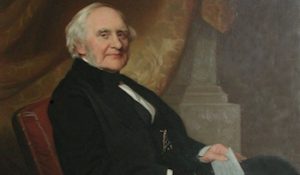
George Peabody
*On this date in 1867. The Peabody Fund was established. The Peabody Fund provided monies for construction, endowments, scholarships, and teacher and industrial education for newly freed American slaves.
Scholars consider it one of the first genuinely modern philanthropies because of how it gave its capital. The Peabody trustees devised a system of self-help by which the Foundation would provide challenge grants to local communities. Thus, the relatively meager return on the Fund's principal could be leveraged. Help would be targeted strategically. The Fund would seek locations with sufficient students and cooperative public officials who would combine the relatively small grant with tax money to build the school.
By the second decade of the Twentieth Century, many southern communities had been able to build schools because of efforts by the Peabody Fund, joined by others such as the Slater Fund, the Jeanes Fund, and the giant General Education Board, established by John D. Rockefeller, Sr. George Peabody was a prominent white-American international investor. He earned an estimated $12 million in his lifetime. He began his career as a stock boy and eventually settled in England.
George Peabody is considered to be the father of modern philanthropy. He aimed to improve society, promote education, and provide the poor with the means to help themselves.